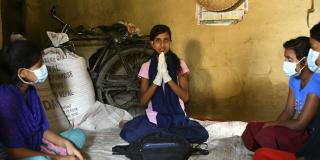
There's been a spontaneous outpouring of goodwill as communities all over the world have come together to fight COVID-19. Our photo gallery shows how volunteers are tackling the pandemic, thanks to the support of UK aid.
Around the world, VSO volunteers are playing vital roles: stopping the spread of disease, educating out-of-school children and helping families overcome financial hardships. None of this would be possible without UK aid. Funded through taxes, UK aid helps alleviate poverty and helps contribute to sustainable development globally.
Encouraging social distancing in Bangladesh
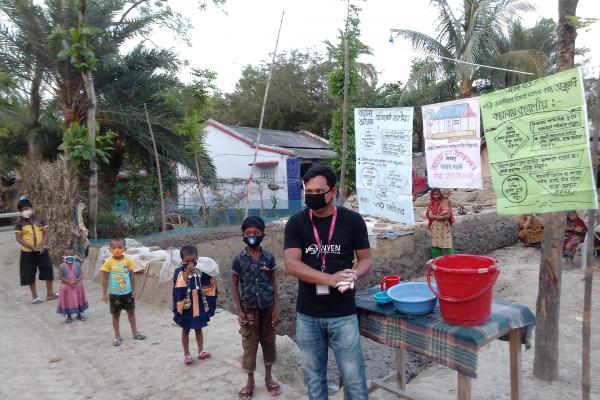
In many countries, social distancing is easier said than done. Bangladesh is amongst the most densly populated countries in the world, with 1269 people per square kilometre.
Former VSO volunteer Mofazzal Hossain is now working as a local TV journalist. When COVID-19 arrived in Bangladesh, he felt compelled to volunteer again.
People are refusing to follow advice on quarantining. So, it’s vital to get reliable health information out to Bangladesh’s wider population.Mofazzal HossainVSO volunteer
Alongside other returned volunteers, Mofazzal, 27, worked to spread the importance of social distancing in the northern Bangladesh district of Dinajpur. Through youth club networks and online training led by VSO experts, Mofazzal is passing on knowledge to over 150 youth clubs supported by VSO volunteers.
“People are still going for prayer at the mosque. People still believe coronavirus is a curse from God,” said Mofazzal at the outset of his project. “People are refusing to follow advice on quarantining. So, it’s vital to get reliable health information out to Bangladesh’s wider population right now.”
Standing up for vulnerable children in Nepal
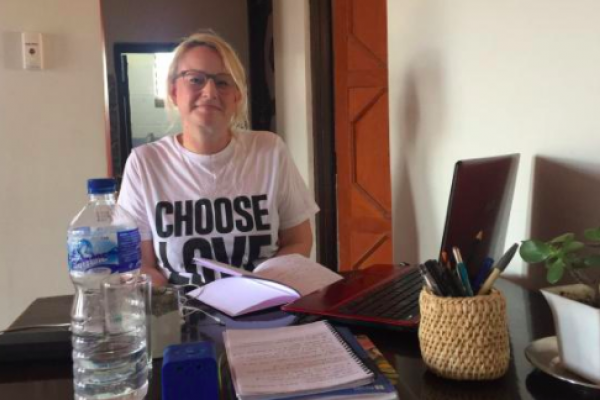
Nicola Whybrow, 38, is a British volunteer on the Sisters for Sisters’ Education project in Nepal. The project is aimed to make education more inclusive and improve educational outcomes for adolescent girls.
Based in Surkhet, Nicola was previously working closely with headteachers and local government officials to support systems around inclusive education. Since the country’s lockdown, Nicola is working from her accommodation on ways to support teachers to ensure students are supported whilst studying at home with limited internet access.
"Whilst school buildings have closed, it is essential to remind children that they are still part of the school community. It will boost their mental wellbeing, reduce impact of trauma, and is essential for them to learn. It is no simple task. There are definite barriers, but we are finding a way," said Nicola.
Spreading awareness and providing training in the Rohingya refugee camps

Awareness, mutual aid, cooperation and humanitarian behaviour are the keys to winning this battle.Anup GoonVSO volunteer
In Bangladesh, there are almost one million Rohingya people living in refugee camps, having been forced from their homes to escape extreme violence and persecution. Amid the COVID-19 pandemic, the cramped conditions in these camps are adding to the risks faced by the refugee population in Cox’s Bazar.
Anup Goon is a VSO volunteer in the refugee camps here, who is delivering pandemic response and awareness sessions for project staff, volunteers and community members so that life-saving knowledge of the virus and how to stay safe can be shared through the camps.
"The first step toward change is awareness. The COVID-19 pandemic teaches us to think and plan differently for the upcoming challenges. Awareness, mutual aid, cooperation and humanitarian behaviour are the keys to winning this battle. VSO always stands up to support the most marginalised and vulnerable, like Rohingya refugees in Bangladesh,” said Anup.
From the classroom to distanced lessons in the home: girls' education in Kenya

Education for Life is a project based in Kenya that offers regular lessons for young girls who have had no choice but to drop out of school at a young age. Since the catch-up centres closed due to social distancing measures at the height of the Kenyan coronavirus outbreak, teachers such as Christine Getty have had to adapt in order to continue the progress their students had been making in class.
Instead of carrying out lessons in the centres, teachers and mentors are continuing to carry out regular lessons over the phone, whilst making home visits to ensure safety and progress of the students.
“Adapting to COVID-19 is so important. If you leave these girls unattended, you lose them. If you don't raise them up, they will feel they are left out and they will forget everything that they had studied. I call them, I visit them, and even though the centres are closed, the students are still valued and education is continuing despite the different challenges that we are facing in this pandemic,” said Christine.
Helping marginalised girls in Nepal with hygiene kits and reusable sanitary pads
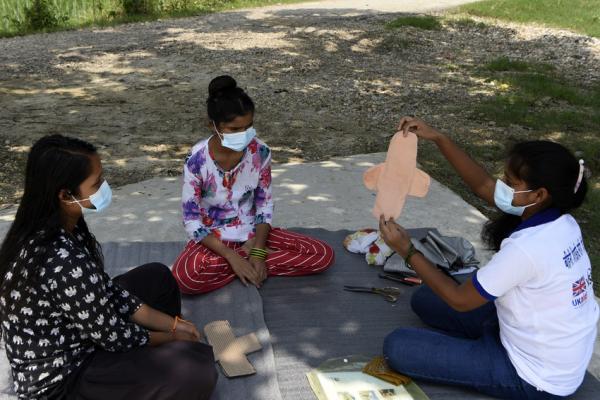
When Nepal went into lockdown, shops and schools closed and the country stayed at home. For young girls, it meant that not only was education affected – but it became impossible to access basic hygiene items.
In response, VSO has provided 980 families in the Dhading, Lamjung, Surkhet and Parsa districts with hygiene kits including soap, a toothbrush, and underwear.
From the skills learnt on the International Citizens Service (ICS), Big Sisters including Muni Gupta from the Sister for Sisters’ project, have been able to help girls get through the lockdown by teaching girls to make homemade reusable cloth sanitary pads.
Keeping Cambodian youth engaged through online training
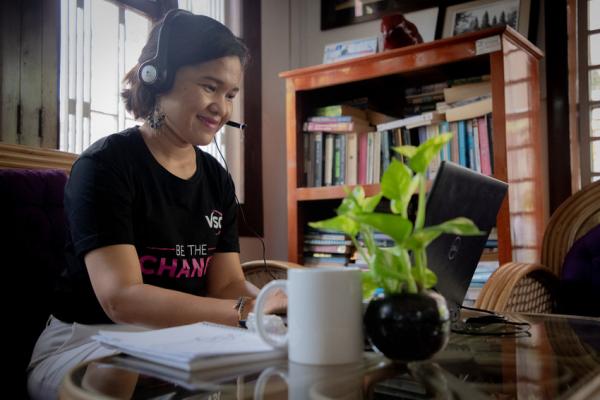
Soriya Kov is a VSO logistics coordinator based in Cambodia. Since the COVID-19 pandemic began, Soriya has had to adapt to her changing role, ensuring the safety of volunteers during the pandemic.
Part of her dynamic role now includes building the capacity of peer educators and mobilising youth alumni to raise awareness in the country’s most remote areas. Whilst previously holding training and working with volunteers, this is not something which now must all be carried out online.
Taking to the airwaves to tackle fake news in Tanzania
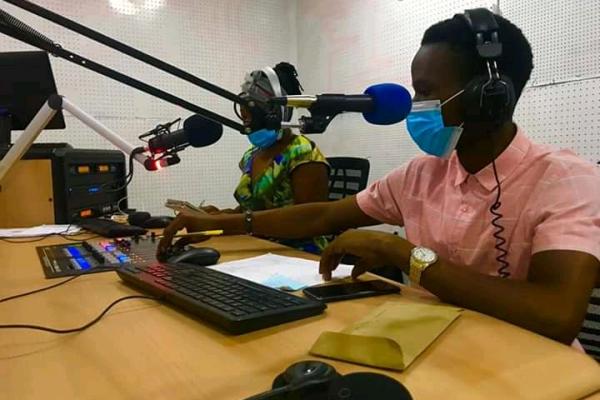
Once COVID-19 hit Tanzania, Paul Bahati, a youth volunteer on the International Citizen Service programme, wanted to help spread reputable safety information throughout his community. However, with strict social distancing enforced he was forced to get creative to reach a large number of people safely.
His solution: a radio show to share trustworthy information, which has reached over 5,000 listeners.
Paul BahatiRadio is a great, free platform right now to raise awareness on how to prevent coronavirus. Whether they’re living in the villages or the towns, listeners trust the presenters. It’s a privilege to have that trust.
ICS alumnus
Helping Mozambique's prison population stay safe
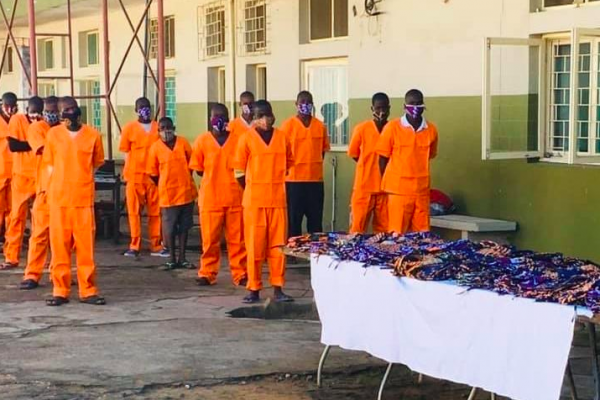
Overcrowding is a threat to the health and lives of prison inmates in Mozambique; now the stakes are even higher since the arrival of COVID-19 in the country.
VSO is working with prisons to launch the campaign “All Created”. Volunteers have trained four inmates and provided eight sewing machines and enough fabric for inmates to produce 2,400 masks in order to aid their safety at the facility.
How Myanmar’s youth are keeping communities safe during the pandemic
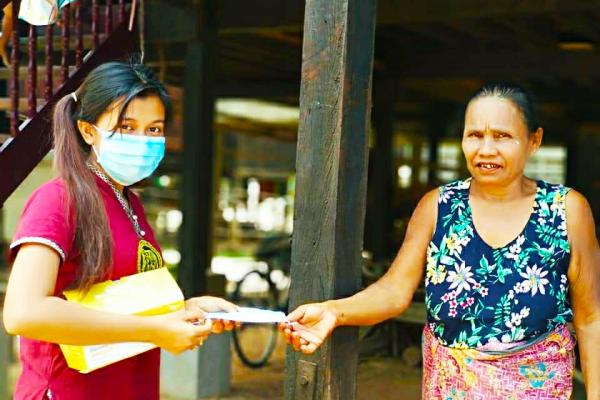
As part of a COVID-19 response campaign, VSO in Myanmar is working with young people in the Mon State. Together, 48 young people are raising awareness, distributing masks, and building washing stations.
Mi Oung Sajin, pictured above, is one of the youth volunteers in Kyaitmayaw Township who has participated in the VSO project and is working with her local community.
For Mi, the project is making an important difference – and she can see the impact.
“People in our community did not wear face masks when they are going to public beforehand. Now, I notice more people have started wearing masks in crowds because of our awareness raising activities,” she said.
Share this blog
In the wake of the coronavirus crisis, it's vital that we stick to our commitments to support the world's most vulnerable people. Please help by showing your support and sharing this blog.
Read more
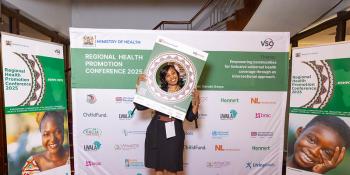
In photos: Our Regional Health Promotion Conference 2025
Check out some of our favourite photos from Regional Health Promotion Conference (RHPC25). This event sought to reimagine Universal Health Coverage through the lens of intersectionality.
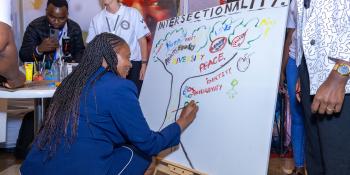
Using intersectionality to create healthy beginnings and hopeful futures
World Health Day brings global attention to the urgent need to end preventable maternal and newborn deaths. Learn more about how our Regional Health Promotion Conference is tackling these issues head on.
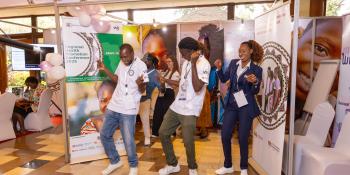
Highlights from the Regional Health Promotion Conference 2025
The Regional Health Promotion Conference 2025 reimagined Universal Health Coverage (UHC) through the lens of intersectionality, by bringing together experts from across East Africa and beyond.
